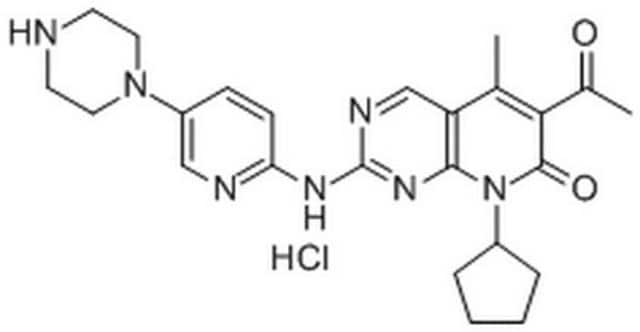PZ0199
PD 0332991 isethionate
≥98% (HPLC), powder, cyclin dependent kinases (CDK4, CDK6) inhibitor
Synonym(s):
6-acetyl-8-cyclopentyl-5-methyl-2-[[5-(1-piperazinyl)-2-pyridinyl]amino]pyrido[2,3-d]pyrimidin-7(8H)-one 2-hydroxy-ethanesulfonic acid (1:1), Palbociclib isethionate
About This Item
Recommended Products
product name
PD 0332991 isethionate, ≥98% (HPLC)
Quality Level
assay
≥98% (HPLC)
form
powder
color
white to beige
solubility
H2O: 5 mg/mL, clear
storage temp.
room temp
SMILES string
OCCS(O)(=O)=O.CC(=O)C1=C(C)c2cnc(Nc3ccc(cn3)N4CCNCC4)nc2N(C5CCCC5)C1=O
InChI
1S/C24H29N7O2.C2H6O4S/c1-15-19-14-27-24(28-20-8-7-18(13-26-20)30-11-9-25-10-12-30)29-22(19)31(17-5-3-4-6-17)23(33)21(15)16(2)32;3-1-2-7(4,5)6/h7-8,13-14,17,25H,3-6,9-12H2,1-2H3,(H,26,27,28,29);3H,1-2H2,(H,4,5,6)
InChI key
LYYVFHRFIJKPOV-UHFFFAOYSA-N
Gene Information
human ... CCND1(595) , CDK4(1019) , CDK6(1021)
Application
- to incubate MCF10A cells to verify cyclin D1 inhibition of autophagy involved cyclin-dependent kinase activity
- as a cyclin dependent kinase 4 (CDK4) inhibitor to study its anticonvulsive property in Drosophila
- to mimic the inhibitory effect of 5α-dihydrotestosterone (DHT) on HPr-1AR cell cycle progression and growth
Biochem/physiol Actions
Features and Benefits
Other Notes
signalword
Danger
hcodes
Hazard Classifications
Acute Tox. 3 Oral
Storage Class
6.1C - Combustible acute toxic Cat.3 / toxic compounds or compounds which causing chronic effects
wgk_germany
WGK 3
flash_point_f
Not applicable
flash_point_c
Not applicable
Certificates of Analysis (COA)
Search for Certificates of Analysis (COA) by entering the products Lot/Batch Number. Lot and Batch Numbers can be found on a product’s label following the words ‘Lot’ or ‘Batch’.
Already Own This Product?
Find documentation for the products that you have recently purchased in the Document Library.
Customers Also Viewed
Articles
Review properties, activators and inhibitors, and available products for researching cyclin-dependent kinases (CDKs).
Our team of scientists has experience in all areas of research including Life Science, Material Science, Chemical Synthesis, Chromatography, Analytical and many others.
Contact Technical Service
















